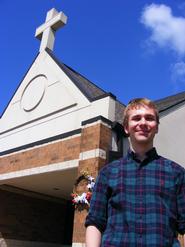
Throughout history, the interplay of morality and law has proved to be a point of debate and intense interest for philosophers. Specifically, does one concept determine the other? And if so, does law establish what is moral or should it be the other way around? The issue is even more perplexing in modern society, where religion plays a much smaller role than in most other cultures in history.
This summer, Thomas Cheeseman ’12 will tackle the complex philosophical principles regarding law, morality and religion under a Levitt Research Fellowship Grant with Professor of History Doug Ambrose. Cheeseman, an economics major with a double-minor in math and history, hopes to learn more about the interaction and morality and law in modern times in the project “The Naked Public Square? The New Natural Law Movement’s Impact on Public Morality.”
After World War II, many philosophers had to change their perspective on the interconnection of law and morality. Prior to the Holocaust, many philosophers held a positivist outlook on law, in which morality is defined by the law, with no consideration for an overarching moral code that guides all bodies of law. As Cheeseman puts it, “The positivist outlook on the law holds that that law merely gives or proscribes rights, without any reference to a transcendent order. Thus, that which the law allows is allowable.”
The disastrous outcome of the Holocaust had serious consequences for this sort of philosophical outlook because during the Nazi regime, the government allowed for the legal propagation of mass murder among other atrocities. Post WWII, positivism was quickly replaced by a renewed endorsement of Natural Law, which states that certain actions can be deemed automatically immoral and wrong no matter what the context is. This renewal of Natural Law theory was termed the New Natural Law Movement. Without some belief in Natural Law, no individual or organization could judge the Nazis’ actions as fundamentally “wrong.” Natural Law also plays a role in modern lawmaking, particularly with regard to controversial issues such as abortion and same-sex marriage.
Religion serves to further complicate the intersection of morality and law. Cheeseman relates that his interest in the subject of the New Natural Law Movement stems for a passage in Dostoyevsky’s Brothers Karamazov, which states, “If you were to destroy in mankind the belief in immortality, […] nothing then would be immoral; everything would be lawful, even cannibalism.” In other words, religion not only fine-tunes one’s moral compass, but religion creates morality completely. The concern that governs Cheeseman’s research this semester is the prevalence of atheism in modern culture, how it affects our moral thought and attitude toward law.
Cheeseman and Ambrose will conduct their research by reading and analyzing books by both ancient and modern law theorists as well as documents such as the Manhattan Declaration. They will begin with ancient law theory, including Plato and Aristotle, and St. Thomas Aquinas, and then move on to a correspondence between Eric Voegelin and Leo Strauss on faith and reason. From that point they will read modern Natural Law theorists including John Finnis, Lon Fuller, and Robert P. George. Cheeseman states, “I look forward to working with Professor Ambrose and learning more about the interconnection of faith, reason, the Natural Law and morality.”
The subject of Cheeseman’s research is one that lawmakers and philosophers alike have struggled with for millennia. Cheeseman will explore the connection between belief in Natural Law and religion, which he believes can help shape both his view and society’s view of modern issues in law.
Thomas Cheeseman is a graduate of Chardon High School in Chardon, Ohio.
Posted May 25, 2011
